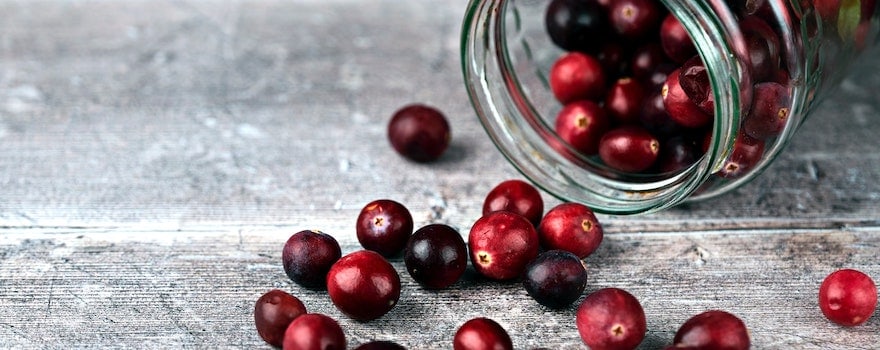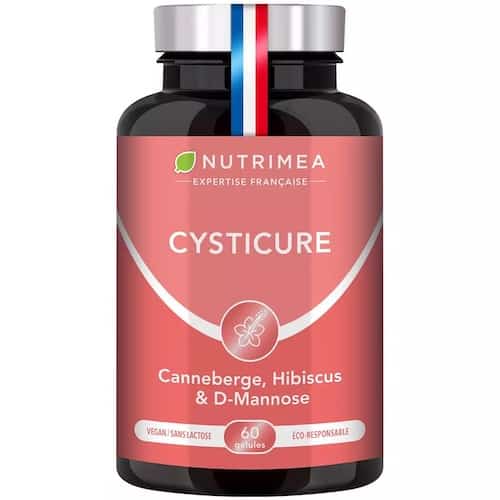Best dietary supplement for cystitis: our selection
We analyzed 11 over-the-counter products sold online according to 6 criteria and selected the Cysticure supplement offered by the Nutrimea laboratory.
Our selection criteria
- Active ingredients: many active ingredients exist to preserve the urinary tract, and some are more effective than others.
- Format: supplements for cystitis can be in the form of capsules, powder (sticks), or juice.
- Certificate of analysis: verification of the absence of heavy metals and suspicious solvents
- Price / day: this is the price per day of the treatment at the brand’s recommended daily dose.
- Customer reviews: these product reviews are collected from the brand’s website, review sites, or Amazon.
- Our opinion on the brand: based on the tests of supplement brands we conduct each month.
Best supplement for urinary tract infection
Brand : Nutrimea
Active ingredients: cranberry, hibiscus, D-mannose
Dosage: 2 capsules per day
Certificates of analysis: compliant
Price per day: €0.53
Customer reviews : 4.7/5 (societe-des-avis-garantis.fr)
We recommend this supplement because it is particularly effective and offers excellent value. It contains two plants known to fight urinary tract infections, cranberry and hibiscus, as well as D-mannose, which helps prevent recurrences.
The concentration of active compounds complies with recommendations, notably with 40 mg of PAC contained in the cranberry extract (minimum required: 36 mg – read our guide below for more information).
The dosage is one capsule in the morning and one capsule in the evening.
Nutrimea is a quality French brand offering supplements with concentrated active ingredients at competitive prices (read our full review here). Its product range is particularly extensive.
Use promo code DARWIN10 to get 10% off (no minimum order).
What are the causes of urinary tract infections?
Bacteria in the bladder
Feeling like you always need to go to the bathroom, a burning sensation when urinating, abdominal pain? It could be a urinary tract infection, more commonly called cystitis.
This condition affects more than one in two women during their lifetime, and recurrences are very common.
A urinary tract infection is caused by the growth of microorganisms located in one or more parts of the urinary system. The bacterium most often found is Escherichia coli.
This bacterium normally present in the intestine can be found in the bladder via the urethra and multiply there.
Main causes
Contamination by the infectious agent occurs particularly during sexual intercourse, as movement facilitates the migration of germs.
Insufficient hygiene, or conversely excessive hygiene, can also be a cause. A lack of hygiene will favor the arrival of intestinal bacteria in the urinary tract.
By contrast, excessive hygiene irritates the vaginal flora and promotes the development of bacteria.
Risk factors
Underlying health problems (diabetes, kidney stones, neurological disorders), an insufficient fluid intake, or the use of spermicides or certain medications (antibiotics) increase the risk.
The hormonal changes related to menopause or pregnancy can also lead to a urinary infection.
When should you see your doctor?
It is essential that a urinary infection be diagnosed by the treating physician during a first episode.
Also consult if you are a man, to avoid complications.
But also at each recurrent episode if symptoms persist for more than 3 days, in case of pregnancy, or if there are associated symptoms (fevers, lower back pain).
Active ingredients and herbs to prioritize for treating urinary tract infections (over-the-counter)
N.B.: Urinary tract infections should not be left untreated because they can become complicated quickly. For prevention, or in the case of uncomplicated recurrent cystitis, certain active ingredients can provide effective relief. If symptoms persist after 48 hours, consult a doctor.
Cranberry

This is THE plant for urinary infections. This small fruit contains molecules called proanthocyanidins with anti-adhesive properties1 : they act on urinary infections caused by the bacterium Escherichia coli, blocking its adhesion to the bladder wall.
Cranberry supplementation reduces symptoms during an ongoing infection2.
A study3 conducted on 150 women aged 21 to 72 showed that cranberry reduced the number of symptomatic urinary tract infections, as well as antibiotic use over one year.
Who can use it? Cranberry supplements are well known to women with recurrent cystitis, but some precautions are necessary.
Long-term use increases the risk of kidney stones, and this plant can interact with medications, notably anticoagulant medications.
Bearberry
Also called bearberry, uva-ursi leaves are traditionally used in the treatment of symptoms of non-severe recurrent cystitis.
Uva-ursi contains an active compound, arbutoside, responsible for its antibacterial activity, able to relieve burning sensations and the frequent need to urinate4.
Uva-ursi is a powerful plant but not harmless! It is not suitable for everyone nor for long-term use.
D-mannose
This glucose-like sugar is produced naturally by our bodies, and is also found in some fruits.
D-mannose reduces the adherence of certain bacterial strains to the bladder wall5 and increases the time to recurrence6 between episodes.
The effectiveness of this compound in preventing urinary tract infections has been proven by several studies.
The results are promising, as D-mannose has shown an effectiveness comparable to an antibiotic, nitrofurantoin. Patients in the D-mannose group had a lower risk of side effects7.
Probiotics
Probiotics are bacteria or yeasts that improve the balance of the gut flora. They are naturally found in plain yogurts, cheese, and fermented soy (miso, tempeh).
A course of antibiotics and an unbalanced diet can alter the intestinal and vaginal flora, thereby contributing to the growth of bacteria.
Probiotic supplementation helps reduce the risk of recurrence8 of a urinary tract infection, particularly after antibiotic treatment.
A review of studies concludes the safety and efficacy of Lactobacillus probiotic strains for the prevention of urinary tract infections in adult women.
In which form?
In capsules
Choose enteric-coated capsules for probiotics: this type of capsule resists stomach acid, is easy to take, and better protects the active ingredients.
Tablets and sachets are generally less effective and do not contain live bacteria when they dissolve in the intestine.
For plant remedies, favor dry extracts: the plant is immersed in a solvent, then dried. Once the alcohol has evaporated, the plant’s dry active compound remains.
This form generally allows a sufficient concentration of active compounds to achieve a significant effect, particularly for cranberry and bearberry.
As concentrated juice and decoction
The liquid form is also beneficial: it is very important to drink enough for the prevention and treatment of a urinary tract infection.
Concentrated cranberry juices are a good alternative, as are decoctions of plant leaves such as bearberry.

Criteria to consider
Composition
Make sure to have probiotic strains from the lactobacilli family; they have stronger evidence of effectiveness in the context of urinary tract infections.
Decoctions and concentrated juices may contain sugar and preservatives, check carefully that there are no added flavorings; the ingredient list should contain only plants.
Choose so-called « bulk » forms to make sure of it.
Dosage
For probiotics, the presence of several billion bacteria helps ensure that a majority of the strains reach the site of action.
Herbal products should contain a certain concentration of active compounds: a sufficient dosage enables a significant effect.
Check that the daily dose of cranberry capsules provides 36 mg of proanthocyanidins (called PAC), or for juice, choose products containing at least 25% (preferably 100%!) pure cranberry juice.
For liquid forms of bearberry, the decoction requires 3 grams (i.e. 3 teaspoons) of leaves per cup of water, three times a day, in order to obtain a sufficient amount of arbutoside (the active compound).
Organic certification
Especially for herbal juices and decoctions: organic certification best ensures the absence of pesticides, and the control of raw materials.
To verify that a product is certified organic, you can find the name of the certifying body on the Agence Bio website.
What to do to prevent a urinary tract infection?
On a daily basis
- Wear cotton clothing, limit tight clothing, to reduce the risk of sweating that promotes bacterial growth.
- Change sanitary pads and tampons frequently during your period.
- Wipe from front to back, urinate right after sexual intercourse, and don’t hold back from going to the toilet! The longer germs stagnate, the more they multiply.
- Also remember to completely empty your bladder each time you go to the toilet.
- Leave antibacterial soaps in the cupboard! They literally strip the protective vaginal flora and promote the proliferation of germs. Instead, opt for a gentle alcohol-free soap.
In the diet
- In case of cystitis, it is recommended to drink at least 1.5 liters of water per day to help eliminate germs.
- You can drink herbal teas made from thyme or rosemary, which have antimicrobial properties.
- Fight constipation, which contributes to the stagnation of germs: increase your daily intake of fiber, green vegetables, and fruit.
- Limit spices and some stimulating beverages like coffee or white wine, which can irritate the bladder.
- Boost your immunity by eating foods rich in vitamin D (sardines, mackerel, tuna, smoked herring), and in vitamin C (bell peppers, citrus fruits, blackcurrants, fresh parsley).
To summarize
Some criteria should be considered to choose the right dietary supplement for urinary tract infections:
- Composition: Probiotics should contain strains from the lactobacilli family
- Active concentration: cranberry capsules should provide 36 mg of proanthocyanidins (called PAC) per day, juices should be at least 25% (if possible 100%!) pure cranberry juice
- Cultivation method: certified organic for plants, juices, and decoctions
- Form: enteric-coated capsules for probiotics that resist stomach acid. For herbs, prefer dry extracts.
Sources and scientific studies
1.Nicolosi D et al. Anti-Adhesion Activity of A2-type Proanthocyanidins (a Cranberry Major Component) on Uropathogenic E. coli and P. mirabilis; Antibiotics. 2014 Jun; 3(2): 143–154
2. Manzorou M et al. Cranberry Consumption Against Urinary Tract Infections: Clinical State-of-the-Art and Future Perspectives; Curr Pharm Biotechnol. 2018;19(13):1049-1063
3. Stothers L et al. A randomized trial to evaluate effectiveness and cost effectiveness of naturopathic cranberry products as prophylaxis against urinary tract infection in women; Can J Urol. 2002 Jun;9(3):1558-62
4. Assessment report on Arctostaphylos uva-ursi (L.) Spreng., folium [online]. EMA.
5. Nunzio C.D et al. Role of D-Mannose in the Prevention of Recurrent Uncomplicated Cystitis: State of the Art and Future Perspectives. Antibiotics. Apr 2021;10(4):373
6. Porru D et al. Oral D-mannose in recurrent urinary tract infections in women:A pilot study. European Urology Supplements; Mar 201312(1):e894-e895
7. Kranjčec B et al. D-mannose powder for prophylaxis of recurrent urinary tract infections in women: a randomized clinical trial; World J Urol. 2014 Feb;32(1):79-84
8. Grin P M et al. Lactobacillus for preventing recurrent urinary tract infections in women: meta-analysis. Can J Urol. 2013 Feb;20(1):6607-14




